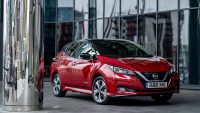Ford’s UK boss Lisa Brankin has said now is not the time to tax electric vehicles as rumours ahead of the budget say they could be hit with an annual mileage fee.
The Telegraph revealed earlier this month that EV drivers will face a 3p per mile charge under Rachel Reeves’ long awaited budget, which takes place this Wednesday, November 26.
However, the newspaper’s early report did suggest this wouldn’t come into force until 2028.
Speaking on the BBC’s Big Boss interview, managing director Brankin said: ‘At some point we need to normalise electric taxation versus petrol and diesel but this doesn’t feel like the right time to do it.
‘And what it’s doing is it’s calling out electric the electric mileage in a very different and separate way, and kind of adding an admin burden onto electric car buyers that your petrol diesel equivalent doesn’t have.’
Electric cars pay a low road tax of £10 in the first year and £195 a year after this, but previously they paid nothing. If the vehicle is over £40,000 they pay the additional £425 a year.
Based on the average annual mileage of an electric car in 2024 from the Department of Transport of 8,900 miles, they can expect to pay another £267 annually.
Brankin said: ‘If the government had reviewed everything all together and said, we’re going to implement this scheme for everybody and do it in the same way that kind of works.
‘What we’re doing [with this scheme] is calling out electric vehicle drivers as a special case, making a really visible payment that they have to make and adding an extra admin burden onto them, but I think that in the face of really fragile demand for electric vehicles is just another brake.
‘And we’ve certainly seen through some of our dealer businesses. Customers who had placed orders put them on hold or cancelled pending what happens in the budget.
‘So I think it’s it’s very concerning, because we feel like we’ve just had electric car grants implemented, which was really, really fantastic and great news for us. But now we then have this, which is a brake against that, which just doesn’t seem the right the right thing, and it’s certainly not the right time to do it.’
Some economists have praised the scheme and said the idea of paying for the time using roads makes the system fairer.
This year, fuel duty will bring in £24.4bn but this figure will continue to drop as we move towards 2030 and the ban on selling new petrol and diesel vehicles.


































